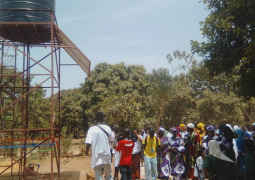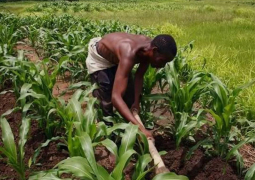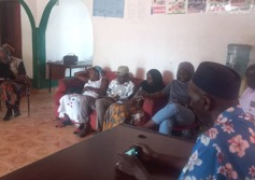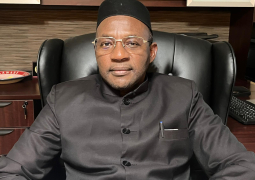In March 2020, when The Gambia registered its first case of the contagious virus, the Ministry of Basic and Secondary Education issued a major pronouncement - the closure of all learning centres under its purview. The move according to the ministry was to ensure the safety of students, teachers and school managers against the virus.
Mariama Kebbeh was in her final year in secondary school at Soma Upper and Senior Secondary School, Lower River Region when the pandemic hit. Mariama was on her preparations for the West Africa Senior Secondary School Certificate Examination that was scheduled for April 2020. The pronouncement from the country’s education ministry hung a cloud of doubt over the conduct of the examination. She said the coming of corona and the regulations introduced by the ministry impacted her education. “It had a great impact on my education because it took me a whole academic year plus months to complete my grade twelve, and because of the long duration, I couldn’t read my books as expected”.
Under the normal academic calendar, grade twelve students sit for their final examinations six months after the beginning of the academic year in September. Unlike previous years, the conduct of the examinations was pushed to late August 2020. This to Mariama and many of her friends, altered their preparations.
Seated under a mango tree at the Gambia College, in her School of Public Health uniform, Mariama, a first year student said corona had an impact on her performance in school. “I never scored what I scored in any of my exams because I always read and prepared but due to the COVID-Holiday, I felt reluctant to read. I was never thinking that we will resume back to school”.
Her wish was to enrol at the University of The Gambia to read Medicine. Due to her performance in the examinations, she could not realise her desire. She got admitted at The Gambia College but has registered for the Private examination conducted by the West Africa Examination Council, in a bid to get better grades that will guarantee her admission to the university to study medicine.
Habibatou S. Camara was also in her final year in Soma Senior Secondary School when the corona knocked. She said regulations put in place by authorities disrupted normal schedules in schools. “Since the pandemic was confirmed in the country, we start lessons very late. Most of the subjects and syllabuses were not covered. Public gatherings were not allowed, we couldn’t even conduct study classes to help cover the syllabus”, she bemoaned.
Habibatou has secured admission to the University of The Gambia’s first-degree programme in English language. Despite gaining admission, she is yet to start her programme as she is financially constrained and could not secure scholarship. For her, in spite of her admission to the university, she believes she could have performed better if it was not for the coronavirus.
Days after the announcement of closure of schools, the Ministry of Basic Education announced the conduct of radio and television lessons. This was meant to ensure continuity of lessons. Similarly, schools devised mechanisms to keep students focused. The moves yielded positive results according to a communiqué from the ministry.
Tahir Senior Secondary School in the Lower River Region is one of the many schools that were affected by the emergency move to close schools. Officials at the school responded to this emergency by creating social media platforms where students were engaged with lessons. This move, according to Vice Principal, Atta UlQuddus Malik, yielded positive results for the school. His school registered a 100% pass record in the WASSCE, a 97% pass in the Gambia Basic Certificate Examination. This he attributes to the online classes conducted by the school. Quddus said the results would have been better if there were no interruptions. “If we were in the classroom, the performance would have been better than what we got”.
In spite of the varied performances, the Ministry of Basic and Secondary Education said the national statistics indicates a positive impact despite all hurdles authorities faced during the pandemic. National statistics had also indicated positive results from schools in Lower River Region. This does not mean there were no negative impacts of the virus on the performances of students.
The Gambia’s Ministry of Health confirmed the country’s first case of coronavirus on Tuesday March 17, 2020.
As of 21st May 2021, The Gambia had officially registered 178 Covid-19 related deaths and 5, 978 positive cases.
26,593 have already been vaccinated against COVID-19 as of 18 May 2021, while 300 people have received their 2nd dose, bringing the total number to 26,893.
This story is produced with support from Journalists for Human Rights (JHR), through its Mobilising Media in the Fight Against COVID-19 in partnership with Mai-Media and (The Point Newspaper).





